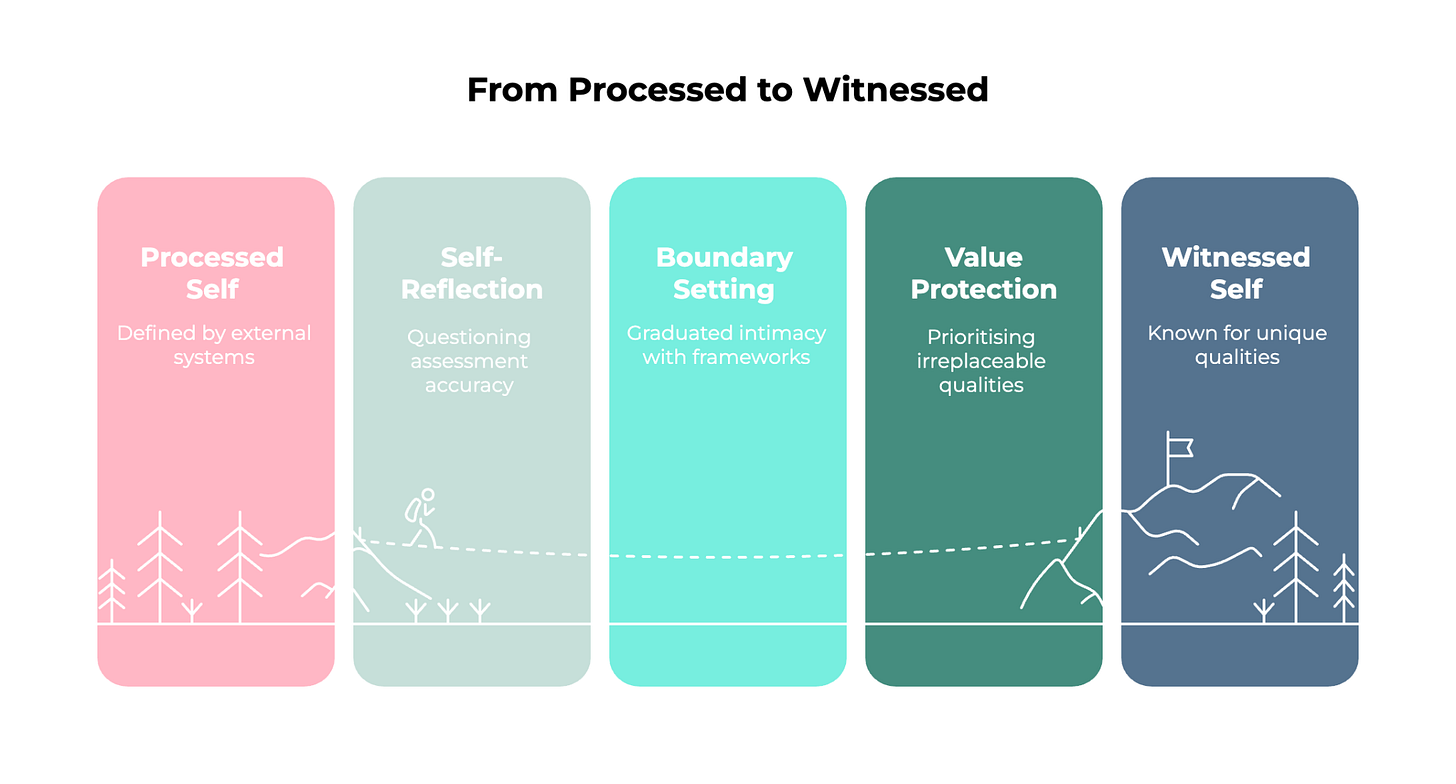Witnessed or Processed?
Psychometric tests are systems that promise to see you but are also built to sort you
🌸 ikigai 生き甲斐 is a reason for being, your purpose in life - from the Japanese iki 生き meaning life and gai 甲斐 meaning worth 🌸
The email arrived earlier this week “Your Personal Profile Analysis results are ready”.
I opened the PDF with a familiar swirl of anticipation and dread. I’m a girly swot about this sort of thing… Myers-Briggs, Clifton Strengths, Belbin Team Roles, Insights colours. I review them all at least once a year, checking if the mirror reveals anything I’ve been avoiding.
Page one of the Thomas PPA assessment;
“Sarah Ennett is motivated by sincerity, honesty and security of employment. They like to feel wanted.”
A deep need typed out in corporate sans-serif.
“Relationships matter to them and they like to feel they are an important part of the team. They need a sincere and diplomatic supervisor who will give them the necessary attention, sincere compliments and make them feel that they are needed.”
A sting of vulnerability if you admit accuracy.
“Whilst one would normally expect Sarah Ennett to be very strong-willed and independent, there are indications that at times they may be seen to emphasise these characteristics to the extent that they appear to be challenging the status quo.”
I read that line a few times. Is that me? Sometimes? Always? The phrasing is so careful, so hedged. “May be seen to emphasise” is doing quite a lot of work there. And who decides what counts as challenging the status quo versus simply having an opinion?
Some of this report feels uncanny, other parts read like they’re describing a stranger. What do we do with that gap? Do we dismiss the whole assessment as pseudoscience, do we assume the test knows us better than we know ourselves?
Thomas International isn’t my therapist, it’s workforce optimisation software. This report that feels like intimate recognition was designed to help organisations manage their human resources more efficiently.
The system that promises to see me was built to sort me.
The machinery of being known
DISC was created in 1928 by William Marston, the lie detector and Wonder Woman guy, who lived in a polyamorous household and believed women were more capable than men. A framework born from someone who challenged social norms has been refined into corporate sorting machinery.
The acronym stands for Dominance, Influence, Steadiness, and Compliance, four behavioural tendencies that can be plotted and analysed. The Thomas PPA uses this framework to generate three profiles; your self-image (how you see yourself), your behaviour under pressure (how you adapt when stressed) and your work mask (how you present in professional contexts).
The test presents you with sets of adjectives and you’re asked to choose which words most describe you and which least describe you. “Determined, pioneering, strong-willed, steady”, pick one most, one least. Over and over. Each choice plots a point on the DISC dimensions.
Every forced choice teaches the system how you categorise yourself. By the end, it’s generated three graphs that supposedly capture the difference between your authentic self and your performed selves.
My results show me high in both I (Influence) and S (Steadiness), an “Adapter” who brings warmth to teams and anticipates others’ needs. Strengths listed as enthusiastic, loyal, responsive. Challenges listed as over-commitment, giving trust too quickly, being too passive.
I sat with that list. Over-commitment? Guilty. I’m writing this essay on a Saturday when I’ve got several other projects humming in the background. But “giving trust too quickly” assumes trust is something to be rationed, that my instinct to believe in people is a flaw rather than a strength wisely deployed. And “too passive” sits oddly next to warnings I might “appear to be challenging the status quo.” Which is it?
The system presents these as objective truths. They’re value judgments dressed as neutral observations. By whose standards? For what purpose?
This is different from what other tests measure. Myers-Briggs looks at cognitive functions and preferences, how you process information and make decisions. Clifton Strengths identifies your natural talents, the things you’re innately good at. DISC focuses on behaviour, specifically how you adapt your actions in work environments.
The system doesn’t just describe me. It predicts how I’ll break.
And what about the bits that feel wrong? The assessment suggests I need “a sincere and diplomatic supervisor” but some of my best work has happened under managers who gave very little support. I still thrived and produced work I’m proud of.
Was that my work mask overriding my authentic needs? Or was the test simply wrong about what I need?
Maybe I need to be challenged. Maybe the test captured one version of me on one day in November and missed everything that makes me adaptable, everything that refuses to fit the graph.
The uncomfortable truth is that I want the test to be right when it flatters me and wrong when it doesn’t. That’s not how truth works.
I think what makes DISC interesting is considering the performance of self. It tries to show you the distance between your authentic preferences and your adaptive strategies. That gap is where exhaustion and ill health can live, where a lot of us spend 40+ hours a week.
The promise and the price
There’s an almost physical relief in reading an accurate description of yourself. Someone, *something*, gets it. The loneliness of being misunderstood lifts, even if only for the minutes it takes to read the report.
But how much of that accuracy is real, and how much is the Barnum effect, statements crafted to feel personal while remaining vague enough to apply broadly? “You have a need for other people to like you” could describe most humans.
Still, we return to these frameworks because being categorised feels like being known. They promise what lovers and therapists struggle to deliver… to see us completely, hold us accurately and tell us we make sense.
But psychometric tests taught corporations how to sort humans long before AI did.
Think about what I just gave Thomas International. My behavioural patterns, stress responses, motivational triggers and breaking points.
Have I handed over an instruction manual for managing me?
DISC emerged from industrial psychology, the same impulse behind time-and-motion studies and assembly lines. Marston wanted to understand human behaviour. We’ve made it extractive. The goal productivity rather than self-actualisation.
My “usage is curriculum” philosophy about AI applies here too. Every time I complete one of these assessments, I’m training the system to categorise humans like me. I’m making myself legible to capital, translating my messy humanity into data points that can be graphed, analysed and acted upon.
The intimacy I feel reading those descriptions? That’s the transaction. To get the comfort of recognition, I accept being instrumentalised.
To feel witnessed, I agree to be processed.
The practice of knowing without being known
The report tells me I may become “quiet and pessimistic” under extreme pressure. What it can’t measure is whether that pressure is unjust, whether the system creating it is broken, whether withdrawal is actually wisdom.
It tells me I “need sincere appreciation and recognition for a job well done.” But it can’t hold the feeling when a reader messages to say my essay changed something for them after I publish something vulnerable.
The graphs may show a snapshot of my behavioural tendencies, but ikigai can exist in the spaces between, the undefineable and unmeasurable.
I’ll keep using these tools. I’m genuinely curious about the patterns, about how I’ve changed since the last assessment, whether the next test will look different after another year of challenge and transformation.
But I’m holding the transaction more carefully now.
When I do my annual review of Clifton Strengths and Myers-Briggs and now DISC, I’m adding a new reflection… What does this not capture about me?
Because self-knowledge and self-optimisation aren’t the same thing. One helps you become more fully yourself. The other helps systems use you more efficiently.
A question that matters for ikigai, is whether we can know ourselves without making ourselves legible to systems that weren’t built to care for us.
I think we can. We must.
It requires treating these frameworks the way I treat AI tools… with graduated intimacy, clear boundaries and awareness of what’s being extracted in exchange for what’s being offered.
Use the mirror. Learn from what it shows you. But remember that mirrors were once surveillance tools. Being seen and being sorted are separated only by who’s holding the glass.
Here’s what I know after reading my three graphs. The most important parts of me aren’t in that report. They’re in Saturday mornings writing to you. In trusting people “too quickly” and sometimes being right. In challenging the status quo when it matters, even if a test says I might not.
Your irreplaceable qualities will never fit neatly on a graph. The work of a lifetime is choosing to protect them, not optimise them away because a system told you to.
May more of you be witnessed than processed.
What about you? Have you ever had a personality test describe you so accurately it felt uncanny, or so wrongly you questioned the whole thing? What parts of yourself do you know no assessment could ever capture? I’d love to hear in the comments.
Sarah, seeking ikigai xxx
PS - Three questions for your bullet journal
What personality frameworks have you used? What did they reveal that felt true, and what did they miss entirely?
If you were to write a “this does not capture about me” list after any assessment, what would be on it?
Where in your life are you performing a “work mask” that’s creating distance from your authentic self? What would it cost to close that gap?
PPS - AI Coaching Exercise
Share your favourite personality assessment results with Claude or ChatGPT and ask it to help you make sense of it;
“You are my reflective coach, this assessment is one partial lens, not “the truth”.
Summarise what this assessment is really saying about me, in everyday language.
From that, infer 3–5 core values and 2–3 emotional needs it hints at.
Name 3 things this assessment cannot know about me but probably should if it wanted to really understand me.
Suggest 3 journalling questions and 2 tiny experiments I could try over the next week to live more in line with the values the report points to, without just making myself more “efficient” for a system.”
Use the response as a starting point for conversation and reflection.
PPPS - This week’s soundtrack: Both Sides Now by Joni Mitchell, this gorgeous song captures a bittersweet recognition that even after examining ourselves from multiple perspectives, there’s still mystery, still complexity that can’t be reduced to measurements. Perfect for anyone learning that being seen from another angle doesn’t mean being fully known.



